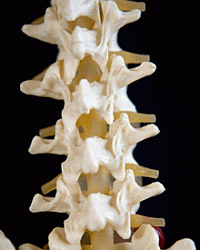28 January 2014. An implant device to treat vertebral compression fractures, made by Benvenue Medical Inc. in Santa Clara, California, was approved for sale in the U.S. by the Food and Drug Administration. The company’s Kiva VCF System treats vertebral compression fractures that occur most often to people with osteoporosis, but can also happen in cases of trauma, or some cancers, such as multiple myeloma.
American Association of Neurological Surgeons estimates some 750,000 Americans get vertebral compression fractures each year, and affect about one-quarter of the menopausal women in the U.S. The risk of fracture increases for both men and women as they age. Vertebral compression fractures occur when vertebral bone in the spine collapses, leading to pain, deformity, and height loss. Fractures occur most often in the middle to lower parts of the back.
The standard of care for vertebral compression fractures is balloon kyphoplasty, a minimally-invasive procedure that inserts a balloon in the spine at the point of fracture, which is inflated to restore the height of the spine. The balloon is then replaced by cement to prevent another collapse.
Benvenue Medical’s Kiva system inserts an implant made of a biocompatible polymer known as Peek-Optima, which is inserted at the point of fracture to support the vertebral structure. The implant is inserted with a coil or guide-wire through a small incision. The size of the implant can be adjusted by the surgeon, which is then cemented in place.
FDA requires pre-market clearance before a medical device can be marketed in the U.S., with higher-risk devices such as implants requiring clinical evidence of safety and effectiveness. Benvenue Medical sponsored a three-year clinical trial of 300 patients who received vertebral augmentation treatments for their compression fractures, either with a Kiva implant or balloon kyphoplasty.
The trial measured outcomes in terms of pain reduction, improvement of mobility, and absence of adverse effects over the 12 months following treatment. The company says the trial showed its Kiva system met or exceeded the performance of balloon kyphoplasty, and expects to present the findings in March 2014 at a meeting of the Society for Interventional Radiology.
The Kiva system was approved for a CE mark, for marketing in Europe, in 2008.
Read more:
- Patent Awarded for Bone Graft Material Production Process
- Cell Therapy Technique Tested to Regenerate Back Discs
- FDA OKs Trial of Biopolymer to Treat Spinal Cord Injury
- Stem Cell Therapy Results Reported for Spinal Cord Injury
- FDA Approves Drug to Manage Spinal Cord Injury Pain
* * *


 RSS - Posts
RSS - Posts
You must be logged in to post a comment.